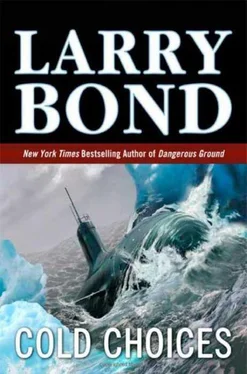“Yes, Captain. I think so.”
“Good, Chief. Report on casualties and the status of the engineering plant. Use messengers. The internal communications aren’t working.”
“I suspect that’s not the only system that isn’t functioning,” remarked Lyachin with a slight grin. The engineer coughed and then sniffed the air, a look of concern flashed on his face. “Smoke?”
“Yes, Chief. I don’t know if it’s from some electrical equipment that shorted out or if we have an actual fire on board, so be careful.”
“Understood, comrade Captain.” Lyachin then pointed at a still-groggy Shubin and ordered, “You. With me. Let’s see how badly we are hurt.”
As the two men worked their way aft, Petrov’s eyes reflexively went back to the darkened status displays. Their blank features mocked his ignorance, but he remembered that the mechanical depth gauge didn’t need power. Grabbing the emergency flashlight attached to the commander’s console, he crawled over to the maneuvering-control station and shined the light on the depth gauge. It showed 197 meters. That was well above collapse depth, but too deep for a free ascent if they had to abandon the submarine. It was clear that they were on the bottom, and it hadn’t been a soft landing.
He scanned the rest of the central post with the flashlight, its bright beam highlighting the smoke that hung in the air. It didn’t appear to be getting worse, but it was thick enough to sting any soft tissue exposed to it, including the lungs. Petrov saw that most of the watch section was on their feet, checking on each other and their equipment. He watched as they made their reports to Kalinin and cared for two men who had sustained more than just bruises.
Kalinin waddled over, favoring his left ankle. He spoke softly. “Two serious injuries, Seaman Naletov and Warrant Officer Kotkov. Kotkov is hurt very badly. He gashed an artery in his leg. They’re putting a tourniquet on him now, but we really need Dr. Balanov. I’ve sent a runner to go look for him. As for the ship’s systems, everything’s nonoperational, even the backup power systems.” The starpom paused to cough, then added, “I felt us collide with the American boat, Captain. We hit and slid along its hull before something pitched us nose down and drove us into the mud.”
“That’s more than I remember, Vasiliy.”
“Yes, sir. You were thrown into the command console when we first collided. You were knocked out. ”
“We’ll piece our memories together later, Vasiliy. Right now we need to figure out how bad off we are. I already sent the Chief Engineer aft to check on the propulsion plant. Send some more runners forward and aft. Pass the word for each compartment to report their status via messenger, since the comms systems aren’t functional.”
“Already done, sir,” replied Kalinin.
“Very good, Starpom.” Petrov took a little comfort in the fact that his first officer was already dealing with the situation. “I presume you fired the emergency gas generators after we struck the American, yes?” Petrov was referring to a set of chemical generators in the main ballast tanks. They could be triggered to send a one-time blast of high-pressure gas that would push the water out of the ballast tanks, hopefully causing the sub to ascend. The system was designed to get a submarine on the surface quickly during an emergency.
“Yes, sir, but it didn’t seem to help very much. Something was driving us down. Given that we are still on the bottom, I’m sure several ballast tanks were crushed on impact.”
Abruptly, the high-pitched shrieking of a panic-stricken man interrupted their discussion. “Captain! Captain! Seawater is entering compartment one! There is water coming into compartment one!” A young seaman scrambled into the dim light. He was visibly shaking; his eyes were wide with fear. It was the junior rating the starpom had sent forward.
“Calm yourself, Seaman Kessler,” Kalinin said reassuringly as he grabbed the young man’s shoulders, steadying him. “Now, give us your report.”
Kessler settled down a little. His shaking had subsided but he continued to gasp for air. Facing his captain, he struggled to speak clearly.
“Captain, the forward bulkhead in compartment one has been breached. There are numerous geysers pouring seawater into the compartment. The hull is… is starting to groan, sir!”
Petrov took the devastating report with a stoic expression, as if it were just part of a routine drill. He had to maintain control even though his own sense of fear was rising. If he panicked, the crew would soon follow suit and they all would perish. He was the rock on which they clung and he had to stand firm.
“Seaman, listen to me. Tell your compartment commander to. ”
Kessler shook his head violently and cut his captain off in midsentence: “Senior-Lieutenant Geletin is dead, sir! And most of the remaining crew members are badly injured!”
With his frustration growing, Petrov pulled on the seaman’s coveralls and looked at the billet number on the left breast pocket. The five-digit number told him what battle department the seaman belonged to, as well as his duty location and watch section. The first number was a “1,” indicating that he belonged to the navigation battle department. Scanning the room with his flashlight, Petrov spotted his commander of navigation, Captain-Lieutenant Ivanov, tending Seaman Naletov.
“Dimitry, take command of compartment one. Assess the situation and report back immediately. Take Starshini Michman Zubov with you.”
Senior Warrant Officer Vitaly Zubov was the senior and most experienced enlisted man on board Severodvinsk. His position starshini michman was roughly analogous to the American chief of the boat.
“Aye, Captain,” replied Ivanov as he and Zubov dashed for the ladder well.
Stepping out of the way, Petrov moved closer to Kalinin, who leaned over and whispered, “Sir, that bulkhead took the brunt of two impacts. Should it fail.. ”
“Yes, Starpom,” replied Petrov testily. “I am well aware of the implications. But I need an accurate report before I consign those injured crewmen to their deaths.”
Kalinin nodded as Petrov shouted, “Captain Mitrov!”
“Yes sir,” came the reply from the entrance to the sonar post.
Turning toward the voice, he ordered, “Get as many men as you can and evacuate the injured from compartment one. Then gather as many air-regeneration cassettes and emergency rations as possible. Post an able-bodied, clear-minded man at the watertight hatch. Seaman Kessler will take you to the injured men.”
“Yes, comrade Captain.” As Mitrov walked past Petrov, the captain grasped his arm, stopping him. Quietly, he said, “Move quickly, Vladimir Vasil’evich. If that bulkhead starts to go, I’ll have to order the hatch closed, regardless of who is in compartment one.”
“I understand, sir,” responded Mitrov. Then turning to Kessler, he said, “Come, seaman, we need to go rescue our comrades.”
For a brief moment, the room was still. Only slight murmurs could be heard as the remaining men tended to the wounded. But then a moving shadow at the rear of the central post caught Petrov’s attention. It was Shubin. He was pale and sweaty, his breathing labored. An IDA-59M emergency respirator hung around his neck.
“Captain, Chief Engineer Lyachin reports that there is extensive damage aft. Compartment eight is flooding from the stern tube. The compartment is over half full of water and. and the level is rising quickly.” The junior officer stopped as he tried to catch his breath. He was obviously fatigued and frightened.
“Please continue your report, Mikhail,” coached Petrov calmly. He didn’t need to rattle the young senior-lieutenant any more than he already was. Petrov and Kalinin needed an accurate account of the situation in the engineering spaces, not the incoherent babblings of an overly stressed and terrified man.
Читать дальше












